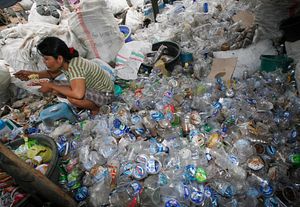Our oceans are facing a daunting crisis: They are being filled with plastic. Many of us are well aware of this environmental and human rights catastrophe, but we are yet to rise to the challenge. In Southeast Asia, our seas and rivers are clogged by plastic waste and maritime species are washing up on our shores with kilos of plastic in their stomachs. I should know, I am an MP from the second-worst plastic polluter in the world: Indonesia.
That is why today, on World Maritime Day, I would like to see my country reverse this position and become one of the world’s leaders in tackling this global issue. This will not be easy but it is a challenge we can no longer ignore.
This year Indonesia made headlines when it decided to send back containers of plastic waste coming from Australia and other Western nations. It was joined by other regional neighbors such as Malaysia and the Philippines. In June 2019, ASEAN member states also adopted the Bangkok Declaration and Framework of Action for combating marine debris.
While such decisions are welcomed, they only scratch the surface. Our lives are anchored to plastic: from what we eat, the cosmetic products we use, the streets we walk on. In Southeast Asia, millions of people’s livelihoods are entirely dependent on plastic: from waste pickers to plastic production workers.
In this context, declarations of good intentions will not be enough, nor fast enough. We need a combination of awareness-raising, behavioral change at the societal level and to take difficult but necessary policy decisions at the national level to tackle the issue from production right through to waste management. Countries must create a mechanism that binds countries into action. But countries also need not forget a — too often overlooked — major aspect of this issue: gender.
Let us take the example of the plastic production process. The few studies that were undertaken on this issue point out that female plastic workers are at increased risk of infertility and breast cancer. At the consumption level, women and girls are more likely to be exposed to microplastics, as they are widely used in makeup, nail polish or period products.
Now let’s look at recycling. In Southeast Asia, you are likely to see women handpick plastic from piles of waste for recycling. These informal waste pickers are a crucial part of the recycling system in the region. In Vietnam, China, the Philippines, Indonesia and Thailand, 85 percent of the plastic extraction for recycling occurs at the waste-picking stage, rather than at home. But because there is no formal recycling system, waste pickers often have low incomes and little protection against chemicals.
Finally, what of the impact of plastic pollution? In coastal communities in Southeast Asia, primarily men go out to sea to catch fish while women collect crabs, shellfish, and small fish at the shore. When beach litter increases, women’s income shrinks. When marine plastic litter increases, men’s income shrinks.
However, despite mounting evidence, this gendered dynamic has been ignored by governments and policymakers. In Asia less than 20 percent of parliamentarians, like myself, are women. The patriarchal society in which we live means that we, women, have been excluded from decision-making at all levels. This is also true when it comes to plastic pollution. A flagrant illustration is that the recent ASEAN Framework of Action on Marine Debris makes no mention of gender.
Because women play a unique role in plastic management and face a different — and sometimes greater — impact of plastic pollution, there can be no comprehensive and durable solutions without their contribution.
As a region made up of some of the worlds’ top plastic polluters, notably, Indonesia, the Philippines, Thailand, and Vietnam, it is time that ASEAN steps up its commitments. The ASEAN Framework of Action on Marine Debris is not enough. It focuses on waste management over plastic production, is not binding on states and does not integrate gender.
Today reminds us of the importance of our oceans, and of the urgency with which our governments must react. It is now time for the next step: ASEAN must take binding regional action that tackles the differentiated and gendered impacts of plastic on people, from its production to pollution.
Mercy Barends is a member of the House of Representatives of Indonesia and a member of ASEAN Parliamentarians for Human Rights (APHR). She represents the Indonesian Democratic Struggle Party (PDI-P) for the Maluku Constituency and is a member of the Commission on energy and mineral resources, research and technology, and the environment.

































